五年级下册英语一课一练Module 9 Unit 1_外研社(一起)
- 格式:doc
- 大小:878.50 KB
- 文档页数:6
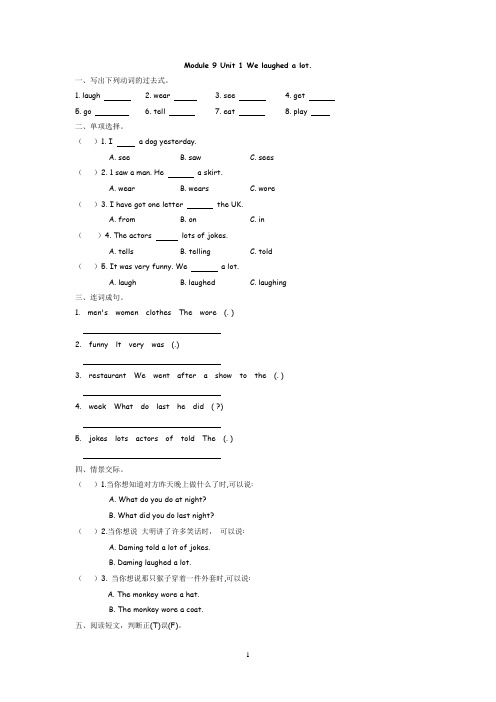
Module 9 Unit 1 We laughed a lot.一、写出下列动词的过去式。
1. laugh2. wear3. see4. get5. go6. tell7. eat8. play二、单项选择。
()1. I a dog yesterday.A. seeB. sawC. sees()2. 1 saw a man. He a skirt.A. wearB. wearsC. wore()3. I have got one letter the UK.A. fromB. onC. in()4. The actors lots of jokes.A. tellsB. tellingC. told()5. It was very funny. We a lot.A. laughB. laughedC. laughing三、连词成句。
1. men's women clothes The wore (. )2. funny lt very was (.)3. restaurant We went after a show to the (. )4. week What do last he did ( ?)5. jokes lots actors of told The (. )四、情景交际。
()1.当你想知道对方昨天晚上做什么了时,可以说:A. What do you do at night?B. What did you do last night?()2.当你想说大明讲了许多笑话时,可以说:A. Daming told a lot of jokes.B. Daming laughed a lot.()3. 当你想说那只猴子穿着一件外套时,可以说:A. The monkey wore a hat.B. The monkey wore a coat.五、阅读短文,判断正(T)误(F)。
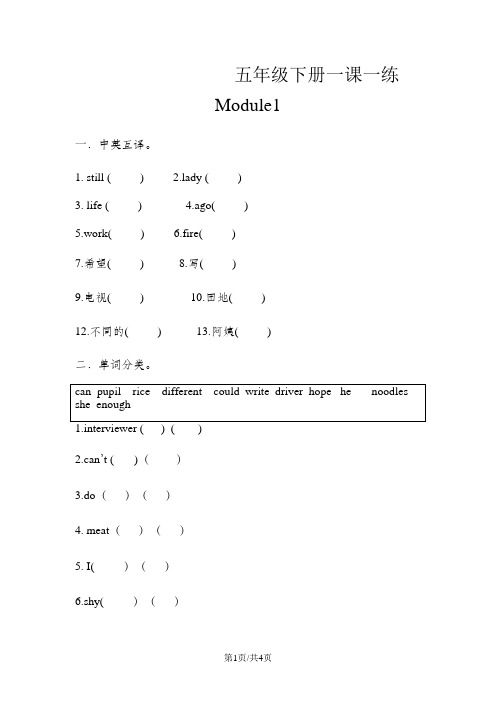
五年级下册一课一练Module1一.中英互译。
1. still ( )dy ( )3. life ( )4.ago( )5.work( )6.fire( )7.希望( ) 8.写( )9.电视( ) 10.田地( )12.不同的( ) 13.阿姨( )二.单词分类。
2.can’t ( )()3.do()()4. meat()()5. I( )()6.shy( )()三.单项选择。
1.They are my( ).A.grandchildB. grandchildren2.---- What are you doing? --- ()A. He’s playing chess.B.I am playing chess.3.There are two() .A.catB.cats4.Look ( ) me.A. inB. at5.Thank you for ( ) to us.A.talkB.talking6. China is( ).A.changeingB. changing四.翻译下列句子。
1. Thank you for talking to us2. China is changing.3. We lived in a small house.宋以后,京师所设小学馆和武学堂中的教师称谓皆称之为“教谕”。
至元明清之县学一律循之不变。
明朝入选翰林院的进士之师称“教习”。
到清末,学堂兴起,各科教师仍沿用“教习”一称。
其实“教谕”在明清时还有学官一意,即主管县一级的教育生员。
而相应府和州掌管教育生员者则谓“教授”和“学正”。
“教授”“学正”和“教谕”的副手一律称“训导”。
于民间,特别是汉代以后,对于在“校”或“学”中传授经学者也称为“经师”。
在一些特定的讲学场合,比如书院、皇室,也称教师为“院长、西席、讲席”等。
4. 现在怎么样?语文课本中的文章都是精选的比较优秀的文章,还有不少名家名篇。
如果有选择循序渐进地让学生背诵一些优秀篇目、精彩段落,对提高学生的水平会大有裨益。
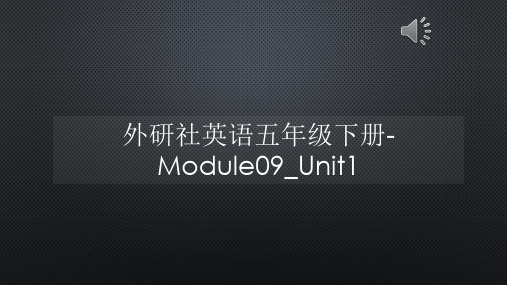

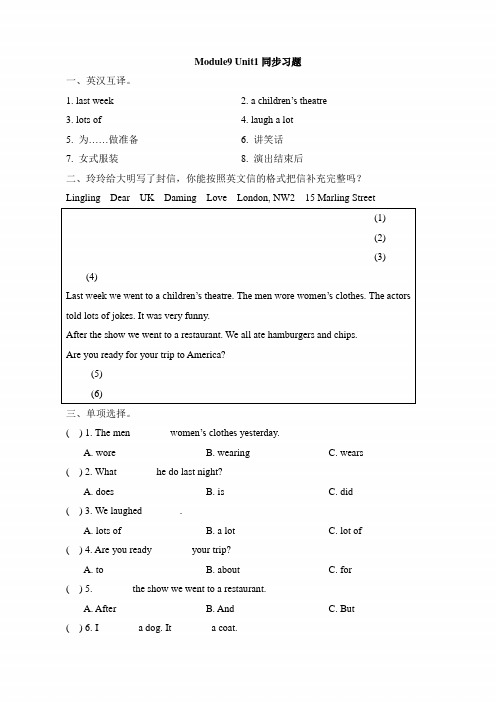
Module9 Unit1同步习题一、英汉互译。
1. last week __________2. a children’s theatre __________3. lots of __________4. laugh a lot __________5. 为……做准备__________6. 讲笑话__________7. 女式服装__________ 8. 演出结束后__________二、玲玲给大明写了封信,你能按照英文信的格式把信补充完整吗?Lingling Dear UK Daming Love London, NW2 15 Marling Street_____(1)__________(2)__________(3)_____ ____(4)_____Last week we went to a children’s theatre. The men wore women’s clothes. The actors told lots of jokes. It was very funny.After the show we went to a restaurant. We all ate hamburgers and chips.Are you ready for your trip to America?_____(5)__________(6)_____三、单项选择。
( ) 1. The men _______ women’s clothes yesterday.A. woreB. wearingC. wears( ) 2. What _______ he do last night?A. doesB. isC. did( ) 3. We laughed _______.A. lots ofB. a lotC. lot of( ) 4. Are you ready _______ your trip?A. toB. aboutC. for( ) 5. _______ the show we went to a restaurant.A. AfterB. AndC. But( ) 6. I _______ a dog. It _______ a coat.A. saw; woreB. see; woreC. saw; wear ( ) 7. I’ve got two letters _______ English.A. onB. forC. in ( ) 8. One is _______ the UK.A. inB. fromC. of参考答案一、1. 上周2. 一家儿童剧院3. 许多4. 大笑5. be ready for6. tell a joke7. women’s clothes8. after the show二、(1)-(6) 15 Marling Street; London, NW2; UK; Dear Daming; Love; Lingling三、1-8 ACBC AACB。
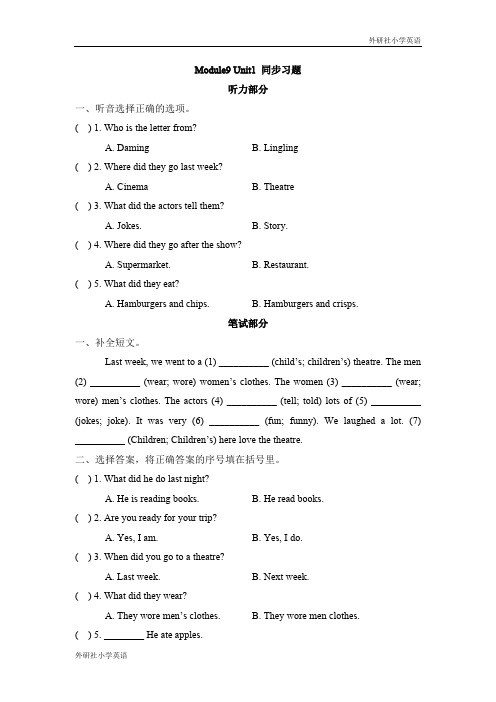
Unit 1We laughed a lot.一、选出与下列图片相符的单词。
A. letterB. actorC. laughD. womenE. restaurantF. theatre1. 2. 3.( ) ( ) ( )4. 5. 6.( ) ( ) ( ) 二、选择合适的介词填空。
of for after in from2. My brother has lots ________ books.3. Are you ready ________ the Children’s Day?4. Daming has got a letter ________ the UK.5. ________ the game we went to the park.三、单项选择。
( ) 1. Yesterday I ________ hamburgers for lunch.A. eatB. ateC. eating( ) 2. There are three ________ under the tree.A. manB. childC. women( ) 3. What ________ he ________ last night?A. did; doB. did; didC. does; do( ) 4. Last Sunday, they went to a ________ theatre.A. childs’B. children’sC. childrens’( ) 5. The actor told ________ jokes. We laughed ________.A. lots of; lots ofB. a lot; a lotC. lots of; a lot四、选出与图意相符的句子。
( ) 1. A. After the show, they went to a restaurant.B. After the show, they went to a library.( ) 2. A. Are they ready for the trip to the US?B. Are th ey ready for the trip to the UK?() 3. A. The men wore women’s clothes.B. The women wore men’s clothe s.( ) 4. A. I’ve got two books in English.B. I’ve got two letters in Chinese.( ) 5. A. John played football yesterd ay.B. John went to the zoo yesterday.五、用所给单词的适当形式填空。
Module 9 Unit 1 We laughed a lot.一、写出下列动词的过去式。
1. laugh2. wear3. see4. get5. go6. tell7. eat8. play二、单项选择。
()1. I a dog yesterday.A. seeB. sawC. sees()2. 1 saw a man. He a skirt.A. wearB. wearsC. wore()3. I have got one letter the UK.A. fromB. onC. in()4. The actors lots of jokes.A. tellsB. tellingC. told()5. It was very funny. We a lot.A. laughB. laughedC. laughing三、连词成句。
1. men's women clothes The wore (. )2. funny lt very was (.)3. restaurant We went after a show to the (. )4. week What do last he did ( ?)5. jokes lots actors of told The (. )四、情景交际。
()1.当你想知道对方昨天晚上做什么了时,可以说:A. What do you do at night?B. What did you do last night?()2.当你想说大明讲了许多笑话时,可以说:A. Daming told a lot of jokes.B. Daming laughed a lot.()3. 当你想说那只猴子穿着一件外套时,可以说:A. The monkey wore a hat.B. The monkey wore a coat.五、阅读短文,判断正(T)误(F)。
Module 9 Unit 1 We laughed a lot 习题一、“教书先生”恐怕是市井百姓最为熟悉的一种称呼,从最初的门馆、私塾到晚清的学堂,“教书先生”那一行当怎么说也算是让国人景仰甚或敬畏的一种社会职业。
只是更早的“先生”概念并非源于教书,最初出现的“先生”一词也并非有传授知识那般的含义。
《孟子》中的“先生何为出此言也?”;《论语》中的“有酒食,先生馔”;《国策》中的“先生坐,何至于此?”等等,均指“先生”为父兄或有学问、有德行的长辈。
其实《国策》中本身就有“先生长者,有德之称”的说法。
可见“先生”之原意非真正的“教师”之意,倒是与当今“先生”的称呼更接近。
看来,“先生”之本源含义在于礼貌和尊称,并非具学问者的专称。
称“老师”为“先生”的记载,首见于《礼记?曲礼》,有“从于先生,不越礼而与人言”,其中之“先生”意为“年长、资深之传授知识者”,与教师、老师之意基本一致。
补全单词。
唐宋或更早之前,针对“经学”“律学”“算学”和“书学”各科目,其相应传授者称为“博士”,这与当今“博士”含义已经相去甚远。
而对那些特别讲授“武事”或讲解“经籍”者,又称“讲师”。
“教授”和“助教”均原为学官称谓。
前者始于宋,乃“宗学”“律学”“医学”“武学”等科目的讲授者;而后者则于西晋武帝时代即已设立了,主要协助国子、博士培养生徒。
“助教”在古代不仅要作入流的学问,其教书育人的职责也十分明晰。
唐代国子学、太学等所设之“助教”一席,也是当朝打眼的学官。
至明清两代,只设国子监(国子学)一科的“助教”,其身价不谓显赫,也称得上朝廷要员。
至此,无论是“博士”“讲师”,还是“教授”“助教”,
其今日教师应具有的基本概念都具有了。
1.th_atre
要练说,得练听。
听是说的前提,听得准确,才有条件正确模仿,才能不断地掌握高一级水平的语言。
我在教学中,注意听说结合,训练幼儿听的能力,课堂上,我特别重视教师的语言,我对幼儿说话,注意声音清楚,高低起伏,抑扬有致,富有吸引力,这样能引起幼儿的注意。
当我发现有的幼儿不专心听别人发言时,就随时表扬那些静听的幼儿,或是让他重复别人说过的内容,抓住教育时机,要求他们专心听,用心记。
平时我还通过各种趣味活动,培养幼儿边听边记,边听边想,边听边说的能力,如听词对词,听词句说意思,听句子辩正误,听故事讲述故事,听谜语猜谜底,听智力故事,动脑筋,出主意,听儿歌上句,接儿歌下句等,这样幼儿学得生动活泼,轻松愉快,既训练了听的能力,强化了记忆,又发展了思维,为说打下了基础。
2._en
3.wo_en
4.sh_w
u_h
6.jo_e
7.funn_
二、单词翻译。
1.theater__________________
2.men__________________
3.women__________________
4.show__________________
ugh__________________
6.joke__________________
7.funny__________________
三、连线。
1.Do you want t o go to Children’ s theater? A.It will take 30 minutes.
2.What did you eat for lunch? B.The men wore in women’ s clothes.
3.What did the men wear? C.Yes, there is quite funny.
4.How long will it take to the place? D.Yes, I do.
5.Is there funny? E. We ate hamburgers and chips.
四、我会选。
[来源:学&科&网Z&X&X&K]
()1.We visited a theater.
A. B.
( ) 2.We laughed a lot.
A. B.
( ) 3.Men.
A. B.
( ) 4.It’s fun ny.[来源:ZXXK]
A. B.
( ) 5. Do you like the show?
A.It takes 30 minutes there..
B.Yes, it’s funny.
五、句子翻译。
1.Children here love the theater..
__________________
2.The men wore women' s clothes.
__________________[来源:ZXXK]
3.After the show, we went to a restaurant.
__________________
4.你美国之行准备好了吗?__________________
5.这太滑稽了。
__________________ Answers:
一、补全单词。
1.theater
2.men
3.women
4.show
ugh
6.joke
7.funny
二、单词翻译。
1.剧院
2.男人
3.女人
4.表演
5.笑
6.笑话
7.有趣滑稽
三、连线。
1.D
2.E
3.B
4.A
5.C
四、我会选。
1.A
2.B
3.A
4.A
5.B
五、句子翻译。
[来源:ZXXK][来源:学.科.网]
1.这里的儿童都很喜欢剧院。
2.那里男人穿着女人的衣服。
3.看完表演之后,我们去了一家餐厅。
4.Are you ready for your trip to the US?
5.It’s too funny.。